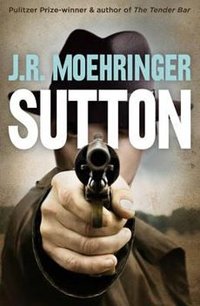First off, Sutton isn’t a crime fiction story per se. It’s a book based on the life of Willie Sutton, a well-known bank robber in New York between World Wars I and II. If you’re looking for a crime thriller, this isn’t it. Instead, Pulitzer-winning journalist JR Moehringer has put together is a dramatic account of Sutton’s life that – by the book’s own admission – drifts somewhere between fact and fiction.
On Christmas Eve, 1969, Willie Sutton is released from the New York State prison, Attica. In no time, he’s back in New York sinking Jamesons, smoking Chesterfields, and feeling that today he’s going to die. As part of his release deal, his lawyer has promised his exclusive story to a major paper. So he has to spend his first day of freedom with a journalist and photographer. They just want to hear about his crimes, but he has his own agenda, and takes them on a journey zig-zagging around the Big Apple, covering his childhood, love life, jobs both legitimate and criminal and, yes, his fantasies.
Sutton was raised in the Irish slums of Brooklyn by an overworked father, and a mother grieving the death of his younger sister. A blind granddad lives with them. Nobody sees the brutal beatings Sutton takes from his older brothers. Yet he succeeds in school, makes friends with Eddie and Happy, two characters in the neighbourhood, and seems to have enough moral fibre to make something of himself.
Young Sutton falls in love with Bess Endner, daughter of a rich WASP capitalist who no-way-no-how is going to see her marry an Irish boy. But he’s madly in love and Bess convinces Happy and Sutton to rob her father’s payroll office. It works, and they drive out of New York, but soon are captured and Sutton gets his first taste of prison. After release, he stays straight as long as he can but is crushed by the news that Bess has been sent away to Germany. He falls into a jewel robbing scheme with Eddie, and a safe-cracker called Doc, who teaches him all sorts of lock-picking skills. Bess marries from her own class, which seems to destroy Sutton, who is now conspicuously wealthy.
Later he starts robbing banks in various disguises, and his career also features daring prison breaks. He witnesses shocking police brutality, even more shocking criminal brutality, and ingenious heists. He’s a man of books and poetry, given to whimsical daydreams, casting himself as a morally sound criminal do-gooder – robbing the banks and sticking it to the rich folks who have been sticking it too the poor throughout history. So, it resonates nicely with things today. Yet gradually his moral centre melts like chocolate in his pocket as he realises that, well, a lot of people around him were hurt… or worse.
The book flits between Sutton’s conversations with the journalist and photographer, and the recollections he falls into at each location. The dialogue offers light relief as Sutton wise-cracks his way through their questioning, lampooning the hippie photographer and needling the serious Jewish writer. But eventually, they challenge him on a few points that he isn’t keen to face with honesty. Sutton’s memories, though, when not filled with adventures, action and edgy criminality, make for depressing reading. His family turns their back on him, and he loses his girl, numerous friends and, frequently, his freedom. Suicide is always on the cards.
Moehringer uses a few deceptions in the telling of the tale that make the ending a little puzzling, and a bit of a let-down. I’m not going to say what it is as it may spoil your enjoyment of the book overall. There’s a final chapter that feels a bit too much like a mopping up of ambiguities and seems awkwardly written. However, Sutton is a very compelling read and if you liked De Lillo’s Underworld or Ellroy’s Underworld USA Trilogy, and want to experience a bit of 20th century American history via crime, this book is an excellent choice.
Blue Door
Print/Kindle/iBook
£6.99
CFL Rating: 4 Stars
